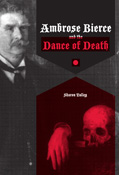Ambrose Bierce and the Dance of Death

- Author(s): Talley, Sharon
- Series:
- Imprint: Univ Tennessee Press
- Publication Date: 2010-02-10
- Status: Active
- Available in PDF: Price $29.40 | Buy Now
- Leaf eReader required for PDF ebooks
Ambrose Bierce and the Dance of Death uses psychoanalytic theory in combination with historical, cultural, and literary contexts to examine the complex motif of death in a full range of Bierce’s writings. Scholarly interest in Bierce, whose work has long been undervalued, has grown significantly in recent years. This new book contributes to the ongoing reassessment by providing new contexts for joining the texts in his canon in meaningful ways.
Previous attempts to consider Bierce from a psychological perspective have been superficial, often reductive Freudian readings of individual stories such as “An Occurrence at Owl Creek Bridge” and “The Death of Halpin Frayser.” This new volume not only updates these interpretations with insights from post-Freudian theorists but uses contemporary death theory as a framework to analyze the sources and expressions of Bierce’s attitudes about death and dying. This approach makes it possible to discern links among texts that resolve some of the still puzzling ambiguities that have—until now—precluded a fuller understanding of both the man and his writings.
Lively and engaging, Ambrose Bierce and the Dance of Death adds valuable new insights not only to the study of Bierce but to that of nineteenth-century American literature in general.
